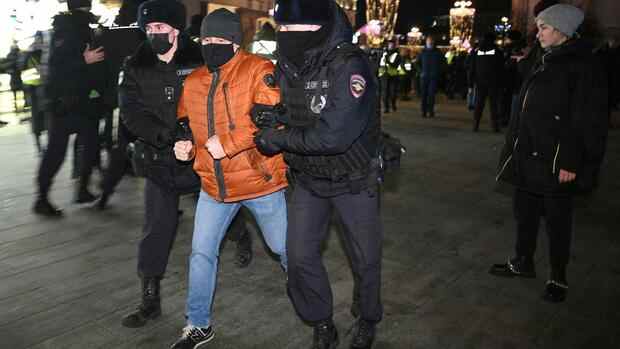Moscow Svetlana is crying, she is pressing the smartphone to her right ear. “Where did you leave Lena?” she asks with a tear-choked voice. The situation is terrible enough due to the “shitty war”. “But she doesn’t have to lose her head and put herself in danger because of that,” says the 45-year-old Russian to her interlocutor.
On the other end of the line is her best friend Lena’s husband. He let Lena go when she said she wanted to take to the streets against Putin. “I have to show that I care, we have to spread the message that the Russian people don’t want war,” she said.
She promised him not to push herself into the foreground. And she vowed not to take part in chanting. Then the door fell shut.
What feels like an eternity after the crisis call with Swetlana, a key turns in the lock of the apartment door. Lena is back home unharmed, but still depressed: she didn’t get to the center of the demonstration on Pushkin Square because she was afraid of being arrested in the crowd.
Top jobs of the day
Find the best jobs now and
be notified by email.
“But I also saw the fear of others,” she says. How great the fear of the brutality of Russian security forces is was also shown by the fact that this time far fewer demonstrators dared to take cover than in previous protest actions.
>> Read also: The day the war came to Europe: Eyewitness accounts from Ukraine
After all, several thousand people still took to the streets across Russia, including again on Friday. In more than 40 cities from Vladivostok in the east to Kaliningrad in the west, the citizens protested against the war – partly in the form of a single vigil, which is actually still permissible today, partly in larger groups.
He would have expected even fewer demonstrators, says Ilya Yashin, one of the last free liberal opposition politicians. “Anyone who thinks that many people take to the streets in times of war is wrong, because people are simply afraid.”
The banner of these protesters reads: “Ukraine – Peace, Russia – Freedom”.
(Photo: dpa)
In fact, the tightening of assembly rights and the many show trials of opposition figures and demonstrators in recent years have intimidated the Russians. Item 31 of the Russian Constitution gives people the right to freedom of assembly. Theoretically. In practice it looks very different.
For years, demonstrations have not only had to be registered, but also approved by the authorities. In the past, the authorities often prevented demos by organizing and approving a counter-event at the requested meeting place. Critical opposition events are now being banned across the board with reference to Corona – which, however, do not apply to crowds organized by the Kremlin.
In this case, too, the public prosecutor’s office and the investigative committee had already threatened criminal consequences for participation in unauthorized demos.
I have to show that I care, we have to spread the message that the Russian people do not want war. Protester Svetlana
The police arrested around 1,500 people across Russia, around 600 in Moscow alone. In one case, the public prosecutor’s office has already opened criminal proceedings. A young woman is said to have thrown a Molotov cocktail at police officers in Moscow. Although no one was harmed, she now faces five years in prison for assaulting officials.
The attack on Ukraine is not without controversy among the population. Although a clear majority of Russians support the separatists in Donbass, a full-fledged war against the “fraternal people” was until recently considered unthinkable by many.
So far, at least, the protests have not posed a serious threat to Putin. Many Russians fear reprisals following the tightening of assembly rights.
For others, the Russian leadership relies on indifference or patriotic euphoria – caused by propaganda images. So far the concept has worked: “I wouldn’t have attacked Ukraine,” says barman Alexander. But that’s none of his business, he adds, shrugs and changes the subject.
Others defend the attack by saying that the population of Donbass “had to hide in the basement from Ukrainian bombing for eight years”. Now it is up to the Ukrainians to be afraid.
Pro-government circles accuse the artist of being a “foreign agent”. He was critical of the Russian invasion of Ukraine.
(Photo: imago images/ITAR-TASS)
Some celebrities raised their voices in Moscow. There are the “usual suspects” from the liberal scene, such as Nobel Peace Prize winner Dmitri Muratov from “Novaya Gazeta”, the popular blogger and journalist Yuri Dudy, the rapper Oximoron and the rock legends Boris Grebenchikov and Yuri Shevchuk. And there are some brave, previously apolitical public figures, such as well-known entertainers Maxim Galkin and Ivan Urgant and actress Chulpan Khamatova (known in Germany for her role in Good Bye Lenin).
It doesn’t have a mass effect. On the contrary: the head of the pro-government organization “League for Safe Internet”, Blo Yekaterina Misulina, attacked the blogger Dudj. The daughter of a Duma deputy called on the authorities to check whether the artist was being financed from abroad and thus had to be considered a “foreign agent”.
So far, the Russians themselves have hardly felt the consequences of the invasion of the neighboring country. There were long queues at the ATMs in Moscow, and the price of electronic goods increased significantly in a day. However, only a few Muscovites are invested in stocks, so the massive fall in stock prices leaves most of them cold. The situation is only likely to change if the expected victory is delayed and the number of casualties increases significantly. The conflicts in Afghanistan and Chechnya have shown this. But the current situation in Ukraine gives little indication that the country can resist for much longer.
More: At least 1,700 arrested at anti-war demonstrations in Russia
